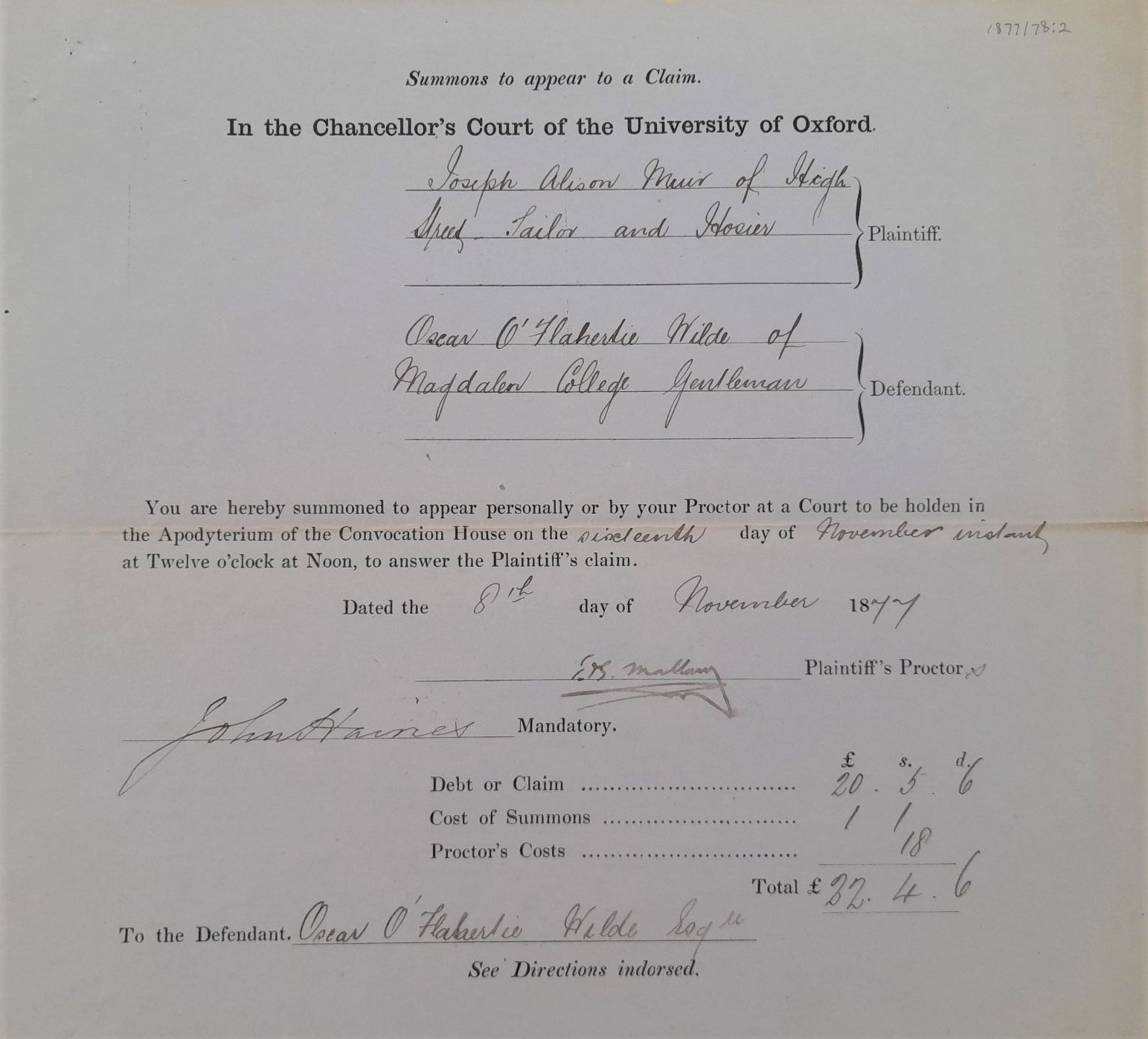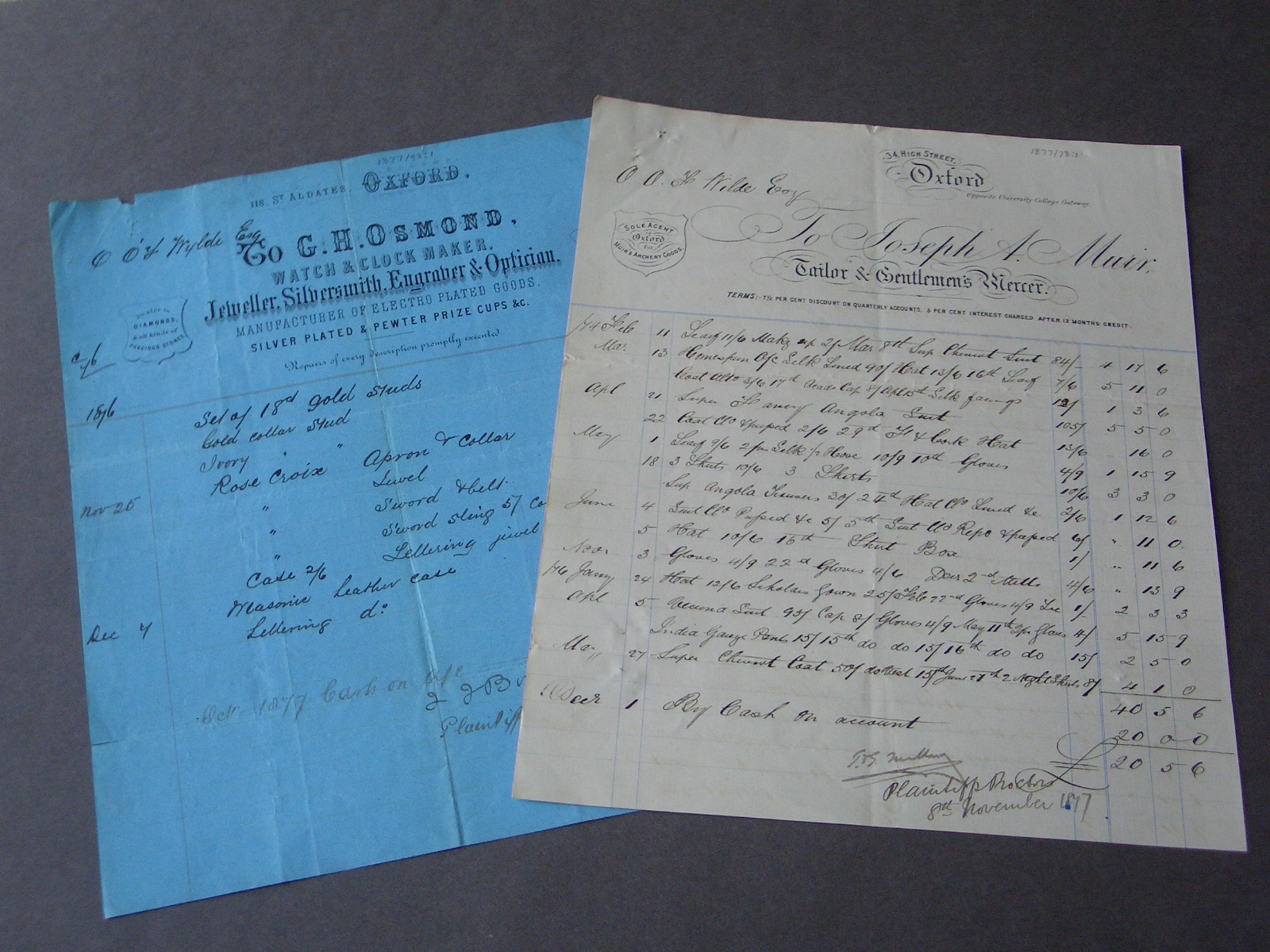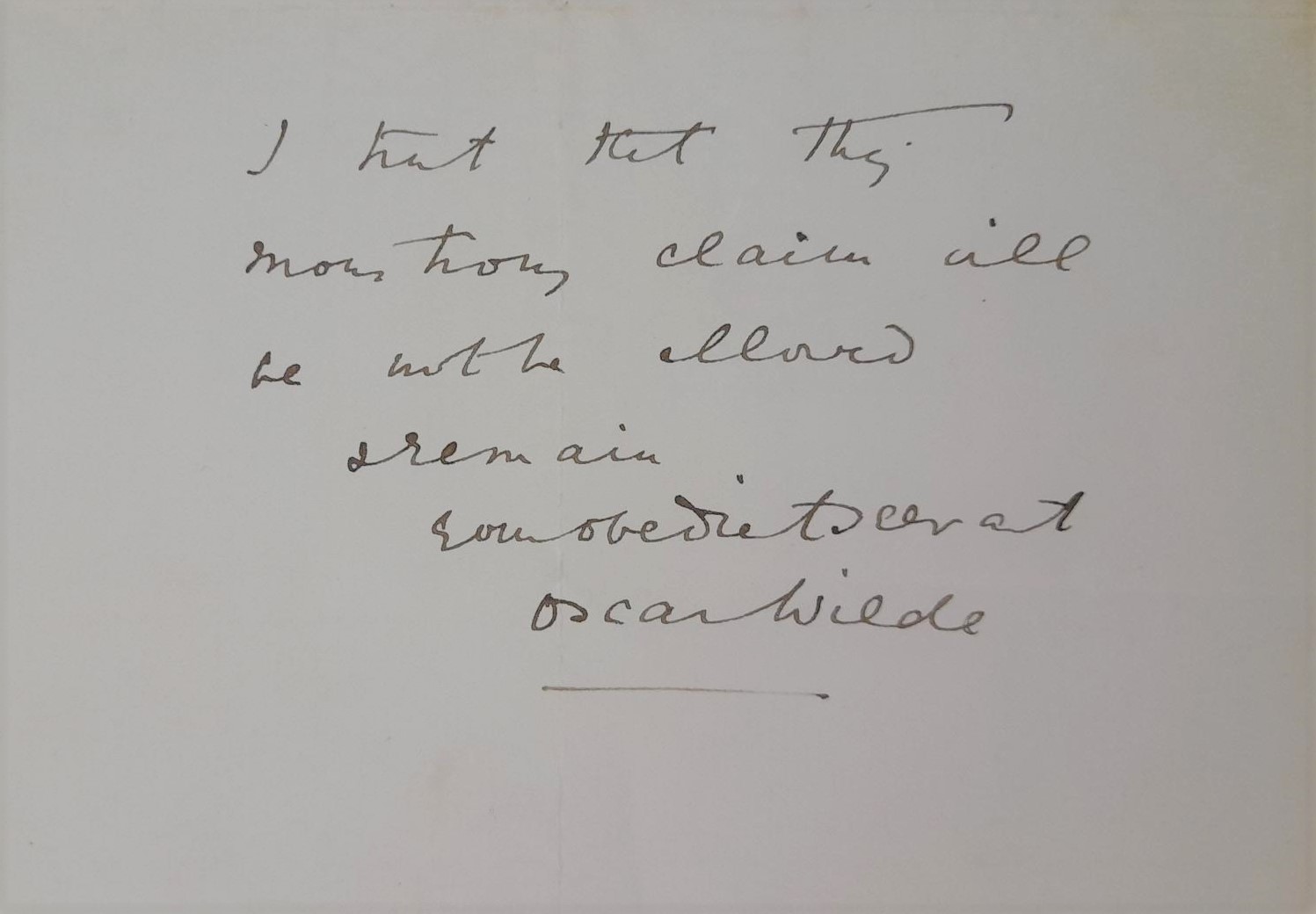For LGBT+ history month, the University Archives’ blog looks at one of Oxford University’s most famous alumni: playwright and poet, Oscar Wilde. Wilde was a student at the University in the 1870s. He matriculated from Magdalen College in 1874 and studied classics (Latin and Greek), as did most students at the University the time. A brilliant student, he achieved first class honours in his Classical Moderations examination (or ‘Mods’, taken roughly mid-way through the BA degree) in 1876.
Alongside his impressive academic performance, Wilde also cut an equally impressive figure in his personal life, dressing stylishly and somewhat flamboyantly for the time. Having joined Apollo, the University Masonic Lodge, he also developed quite a liking, so the story goes, for masonic regalia. Wilde frequented the jewellers and gentlemen’s outfitters of Oxford to stock up and, as we will see, bought a lot of things which were probably not on the shopping list of your average undergraduate.
In late 1877 Wilde’s spending got him into trouble. He owed money to some of the shops at which he’d bought his goods on credit, and whether he couldn’t, or wouldn’t, pay, he ended up before the University’s Chancellor’s Court in the November of that year for non-payments of debts.
The Chancellor’s Court, whose ancient origins lay in the establishment of the post of Chancellor, back in 1214, was the University’s own court. For many centuries it had jurisdiction over University members, both in civil and criminal cases, and for much of that time, also over the people of the city of Oxford. By the late nineteenth century it had lost many of its earlier powers and was chiefly a debt-recovery court, used frequently by Oxford shopkeepers and tradespeople to recoup money owed to them by students at the University.
Two such shopkeepers who were owed money by Wilde did exactly this and took him to the court in November 1877. Wilde received two summonses within that month to appear before the Court.
The first summons was for the case brought against him by Joseph Alison Muir, a tailor of the High Street. According to the tradesmen’s bills, submitted as evidence to the hearing on 16 November, Wilde had ordered a considerable number of items from him over a period of two years, which amounted to over forty pounds’ worth of gentlemen’s attire. This would be roughly £4000 today. They included a ‘superior fancy angola [angora] suit’, ‘superior angola trousers’ and ‘India gauze pants’. Wilde had already paid roughly half of the bill but still owed the tailor over £20.
His second summons to appear in the court, only two weeks later, was for the case brought by George Henry Osmond, a jeweller of St Aldates’. Wilde had purchased jewellery and Masonic regalia there, including gold and ivory collar studs and a Masonic apron and sword. Again, he had only part-paid the bill of over £15, still owing the jeweller just over £5.
In both cases, Wilde was ordered to pay the money owed, plus costs (for the summons and the hearing itself). The costs were sizeable: for the second case he was ordered to pay nearly £3 in costs (on the original debt of £5). Wilde was so outraged by this that he wrote a very angry letter to the court in protest. The letter survives amongst the papers for that case. The costs, he claimed, were ‘a most extortionate and exorbitant claim’. He was so incensed that he intimated that the procedure of the court itself was so corrupt that it was in need of investigation by the University Commission. By this he meant the University of Oxford Commission (Selborne Commission), which had just begun its meetings at Oxford, looking into the financial arrangements of the colleges. It seems unlikely that Wilde’s plea ever reached the Commission’s ears.
Extracts from letter of Oscar Wilde to the Chancellor’s Court, 1877 (Chancellor’s Court papers 1877/98:3)
He ended the letter ‘I trust that this monstrous claim will not be allowed to remain’ but it appears that his protests were to no avail. The official accounts of the cases in the Chancellor’s Court registers here in the Archives record that both were settled by payment of the debt in full. There is no indication that Wilde’s letter of protest let him off in any way.
Wilde’s contretemps with the University authorities did not adversely affect his studies, fortunately, and he performed as brilliantly in his final examinations in Literae Humaniores (Classics) the following summer as he had done in this Mods, achieving first class honours again. He also won the University’s prestigious Newdigate Prize for English Verse that year for his poem ‘Ravenna’ (having spent time there the previous year) which he read publicly at the 1878 Encaenia ceremony in June.
The Chancellor’s Court continued its decline and was used less and less as the nineteenth century wore on; very few cases were held throughout the twentieth century. The very last case to be put before the court took place in 1968 and eleven years later, in 1979, the court was formally abolished.
Wilde’s time at Oxford is discussed by Richard Ellmann in his 1988 biography ‘Oscar Wilde’ as well as within his many other works on Wilde.
For more information about Wilde’s involvement with freemasonry whilst at Oxford, see the article by Yasha Beresiner at OSCAR WILDE Freemasons (freemasons-freemasonry.com)
Stories about Wilde’s time in Oxford, and of other LGBT+ students at the University throughout its history, can be found on the ‘Queer Oxford’ website at Queer Oxford – Celebrating 600+ years of LGBTQ+ history and heritage in the city Oscar Wilde called ‘the capital of romance’.




